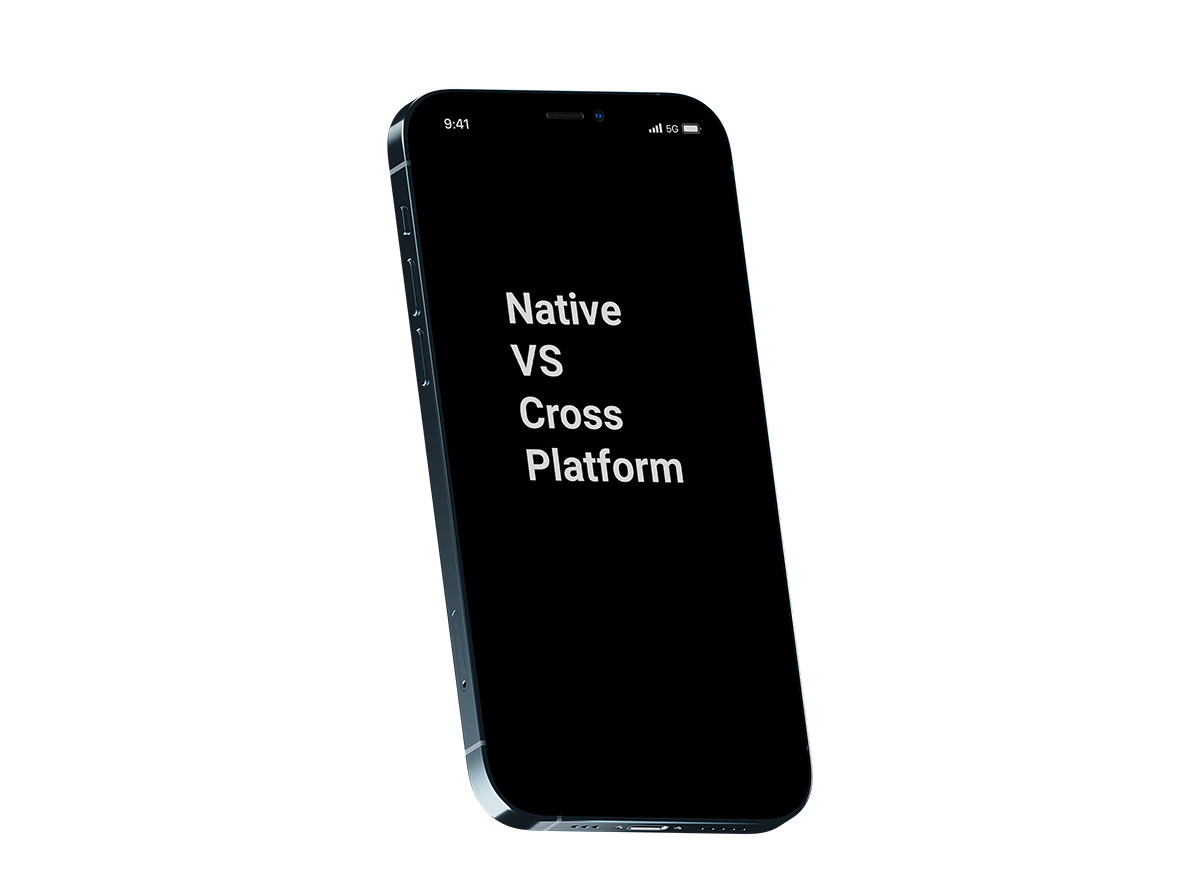Native vs Cross Platform
The development of applications has evolved just as much as smartphones in recent years. Initially, it was necessary to implement applications with completely different code bases for each device type - today, cross-platform applications offer the ability to implement apps for all device types using the same code base.

Time to read: 15 minutes
Subject: App development
Author: Iterator IT
Cross-platform apps are apps developed to function on both Android and iPhone. They have the significant advantage of sharing a code base across both platforms, making them cheaper to develop and support than native apps. Native Apps are apps that are specifically developed for either iOS or Android. The development of these apps takes place using programming languages such as Swift or Kotlin that are closely tied to the operating system. This makes it easier to achieve good performance, but on the other hand, one must also develop two separate apps, at a minimum doubling the workload.
There are many different opinions on whether to create apps as native or cross-platform. At the same time, there are many stories and misunderstandings about what can and cannot be done. In this article, we will try to bring some clarity to the landscape of app development - and why we generally recommend cross-platform development.
Cross-Platform Apps

Cross Platform Apps can be divided into two categories. One is the so-called Hybrid Apps, which function like a website. The app actually starts a website that is designed to look and work like an app on the smartphone. Technologies such as Cordova and Ionic are used to access the hardware on your smartphone, such as the camera or Bluetooth. The advantage of Hybrid Apps is that there are good opportunities to share code with website projects, as they actually use the same technologies. This can be the case if you have a web portal for your system and want to offer an app with the same features.
The other category is apps written in cross-platform technologies, but based on native code and built and function like native apps on the smartphone. These apps can be made in technologies such as React Native or Flutter. The same code works on both iOS and Android, but when the code is built and compiled into an application, it is translated into a native app package for each platform, just like native code. Therefore, in theory, there are no limitations on performance and access to hardware. However, compared to native apps, there are slightly higher demands on the programmer, as the choice of technologies and third-party libraries has a greater impact on performance, for example. Fundamentally, it becomes important for the developer to "do it right" - in return, you can achieve the same performance as a native app.
Examples of known cross-platforms apps: Facebook, Instagram, Skype, Tesla & AirBnb.
Advantages of Cross Platform Apps
- One codebase for both platforms
- Lower development costs and easier testing procedures
- Cheaper and simpler to maintain
- Quick delivery
Disadvantages of Cross Platform Apps
- It requires competent developers
- An additional layer is added to hybrid applications, creating greater distance from the hardware.
Native Apps

Native apps are developed specifically for each platform, either iOS or Android. This ensures high performance due to its close proximity to the hardware and is often recommended by many development companies as it is a well-established and well-known technology. The disadvantage is that it requires two separate codebases, meaning that two separate apps are actually developed. This results in higher development costs, often around a factor of 2. Subsequently, there are also two codebases that need to be maintained and further developed.
When developing games for smartphones, using Native Apps is a logical choice. Advanced 3D graphics, which require complex algorithms and frameworks to support the graphics processor, are often best supported by advanced and well-developed native programming languages.
Examples of known native apps: Angry birds, generally most games, Uber and Waze
Advantages of Native apps:
- Høj performance
- The functionality can interact more effectively with the device.
- This is where most developers have their experience.
Disadvantages of Native Apps
- Expensive and time consuming
- Split code base
- Greater need for maintenance
So what do I choose?
There has been a consensus for many years that if one uses cross-platform technologies, a compromise is made with regards to performance, hardware access, and thus functionality. This was partially true 2-3 years ago, but in recent years, Facebook has heavily invested in their React Native and Google has introduced Flutter to the market. This has fundamentally changed app development, allowing the creation of apps that work on both platforms but function like native apps underneath.
The Facebook applications, including Facebook, Messenger, and Instagram, are all developed using React Native. When a significant player such as Facebook opts to utilize Cross-Platform Apps, it leads to substantial innovation and progression in Cross-Platform technologies and has contributed to the advancement of these technologies to the level of their native counterparts.
We recommend oftentimes that our customers work with Cross-platform appsOften, it is a matter of religion and which method the developers have experience with. However, it is often our assessment that in the vast majority of all use cases, a cross-platform app can be developed that is just as good as a native app, provided that the right technologies have been chosen.
In the event of a game with advanced 2D or 3D graphics and animations, we recommend you to develop a Native App. Most game frameworks are designed for Native programming languages, and some even for C++, bypassing the operating system and accessing the graphics processor directly. This is an entirely different ballgame and requires a completely different approach to the development process and programmers.
Iterator IT
Iterator IT is one of Denmark's leading IoT development companies, specializing in Industry 4.0. We are well-versed in the complex business models that exist in the industry. Over the years, we have assisted industrial companies in developing their Industry 4.0 projects, not just in terms of software development, but also by examining the various elements of the company from the ground up until we find a concrete use case that can create value for the company. In some cases, we have also been the primary driving force that has brought the project to fruition in collaboration with a project manager within the company.
We build the software for the project, including the cloud solution and visual elements for platforms or applications. With our skilled and experienced collaborators who have developed hardware over the years, we are capable of offering end-to-end IoT solutions.
If you have any doubts about what Industry 4.0 can do for you, please feel free to contact us either via our contact form here or call our CEO Casper at +45 31 39 05 69
